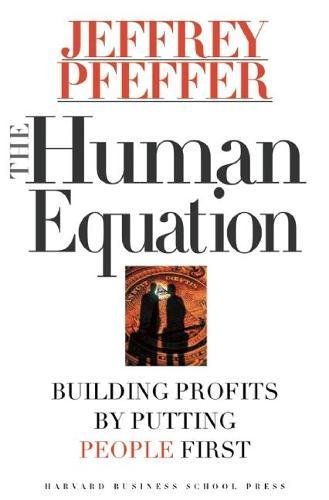The Human Equation
 Buy the Book: Amazon, Barnes & Noble, 800ceoread
Buy the Book: Amazon, Barnes & Noble, 800ceoreadTitle: The Human Equation: Building Profits by Putting People First
Published by: Harvard Business School Press
Release Date: January 30, 1998
Pages: 345
ISBN13: 9780875848419
Overview
There’s a big disconnect in organizational management. On the one hand, research, experience and common sense all point to a direct relationship between a company’s financial success and its commitment to management practices that treat people as assets. Yet, in spite of this evidence, trends in management practice are moving away from this approach. Why is common sense so remarkably uncommon when it comes to managing people? Why do companies habitually overlook readily-available opportunities to boost their financial performance?
This book critically examines the people management practices prevalent in many of today’s businesses. It argues that much of the conventional wisdom is actually tremendously destructive both to the employment relationship and to organizational performance. Drawing on research on numerous companies, industries, and countries, The Human Equation builds an irrefutable business case that the culture and capabilities that come from how firms manage their people provide real and enduring sources of competitive advantage. The book confronts:
- Troubling trends in compensation
- The destructive consequences of downsizing—and some alternatives
- The real economic effects of labor unions and the possibility of achieving positive labor-management relations
- The idea that the stock market is always right and competitive pressures will invariably cause companies to manage in an optimal fashion
- The possibility of a positive, effective role for public policy and regulation in making companies, and economies, more effective.
Praise
“Jeffrey Pfeffer’s grasp of what makes companies successful moves us beyond the anecdotes to the facts. He tells us what the wise already know: People aren’t a commodity to be acquired or sold. Rather, they are the fuel that drives the commerce of business.”
—James P. Hackett, President and CEO, Steelcase, Inc.
“For managers who already treat their personnel as the key actor in their company’s economic success, The Human Equation confirms their policy. For skeptics, the book poses a challenge to change their strategy for managing people effectively.”
—Dr. Walter Kunerth, former Executive Vice President, Siemens AG
“My experience—both in and outside the business world—supports Pfeffer’s view that effective leadership of the whole team is critical for sustained, profitable growth. Pfeffer has created a compelling path of logic, with lots of examples, to link people with profits and above-average people management with above-average performance. I recommend this book to business leaders at all levels.”
—H. A. Wagner, President and CEO, Air Products and Chemicals, Inc.
“Bravo! Jeff Pfeffer illustrates the fact that although most companies say ‘people are our most important asset,’ only an enlightened few actually do put a positive focus on their employees. Through a strong case of facts, he converts what many consider a ‘soft’ subject to a ‘hard’ one, and he proves that a people-based strategy truly is a competitive advantage.”
—Sheryl L. Bartolucci, Executive Vice President, Bank of America
“The Human Equation is simplicity itself. Jeffrey Pfeffer shows that organizations that support, encourage, and build the skills of their people outperform all competitors. The power of committed minds and hearts working toward a common goal wins today and builds for tomorrow.”
—Frances Hesselbein, President and CEO, The Drucker Foundation
Backstory
The 1980s and 1990s saw a burgeoning literature on high-performance or high-commitment management practices—an approach that reliably produced a 30%-40% difference in productivity and other dimensions of performance. The evidence was increasing that how companies managed their people was the single most important factor accounting for variation in performance. Moreover, there were a relatively small number of management practices that cut across the myriad studies of companies in a variety of industries and countries.
I was teaching Stanford’s required course on human resource management having helped developed the predecessor elective class on this same subject. When I went to find a book to use with the class, I didn’t see one that I liked. Most books on human resources dealt with the details—job analysis, compensation design, anti-discrimination practices, and so forth. But I needed a book that would approach managing people from a more strategic perspective.
So I wrote The Human Equation to be used in classes on strategic human resource management and also to inspire and educate companies and their leaders about how to manage people to produce sustained competitive advantage.